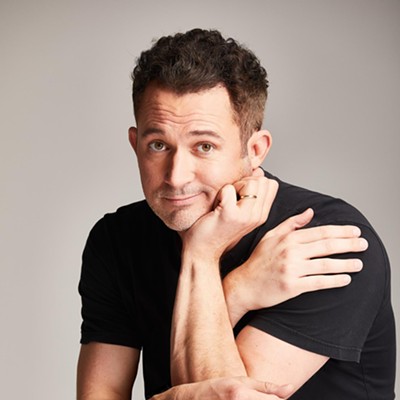Gun violence, social persecution and high-pressure decision-making are issues that people today have to cope with at a young age. This year, high schoolers participating in Arizona Theatre Company's Summer on the Stage program are exploring those issues—and what happens when people handle them poorly—in two plays.
In Your Eyes, which has never been publicly performed, is a musical from the Tony Award-winning duo of Brian Yorkey and Tom Kitt. It's about high school students locked in a classroom without a teacher during a school lockdown. There's a possible shooter on campus, and no one knows the identity or the location of the gunman. As time passes, the students realize the shooter could be one of the people locked in the room.
Stephen Wrentmore, artistic director of the Summer on the Stage program, says the dialogue takes a Lord of the Flies-esque turn as the students try to decide what to do next.
"It's a really tense drama, but within it the music is so beautifully gauged and eloquent. It allows these young people, in the best tradition of music theater, to express those deeper fears that are inside and bring them to the surface and share them with the audience," Wrentmore said. "You can't engage in a play like In Your Eyes without exploring what happened at Columbine and every other ghastly experience that's happened in high schools."
With the threat of violence ever-present in society, Wrentmore says the opportunity to perform something related to it is good for the students.
"The music allows them to express their feelings about it, but also to wear the coat of another character who does have an opinion about it," Wrentmore said. "It's absolutely a play that resonates with these young people; it's something that is connected to their lives, something they understand implicitly."
The other play, Elephant's Graveyard, is a sensationalized version of the true story of Mary the elephant. In 1916, Mary worked with Sparks World Famous Shows circus. There are conflicting accounts of what exactly happened, but somehow Mary killed an elephant trainer on his second day on the job. Mary was hanged for his death. In the play, Mary is provoked and accidently kills someone.
"The town decides that the only logical thing to do is put the elephant on trial," Wrentmore said.
Mary is found guilty and the townspeople are left with the task of executing an elephant.
"It captures the idea of the absurdity of justice but also it captures the idea of what it means to be a rural community."
Wrentmore thinks the serious nature of both plays give the students a chance to be a part of the dialogue about social justice in the United States.
"It's opening up a conversation with these kids who are living this experience. They have lockdown drills; they know this stuff." Wrentmore said, noting it's a different experience than the one he grew up with. "I'm English; we don't do guns there. I've never had the experience of a lockdown. I've never been locked in my room while a threat stalks outside."
But that threat is what Wrentmore thinks makes these performances relevant.
"That stalking, or whatever you want to call it, actual or metaphorical, is present in both these plays. I love that these plays open up this huge debate and conversation."
Summer on Stage is an annual five-week artistic training program for high school students, which finishes with a play and a musical. ATC tries to make sure the finish involves different kinds of stories. In the past, they've done both Shakespeare and Legally Blonde.
"I'm really excited about the choices we've made because they've rewarded us intellectually, artistically. And they've given the kids vehicles to explore who they are as young people," Wrentmore said. "My experience has been that every time we raise the bar, the kids clear it. I find it so utterly rewarding and life affirming."
ATC asks program applicants to provide a creative representation of why they want to join the program, such as through a painting or poem.
"We don't audition anyone. What we want is a commitment of passion and a willingness to learn," Wrentmore said.








